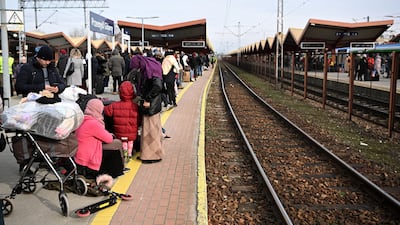Live updates: follow the latest news on Russia-Ukraine
The British government has changed the entry rules for the Ukrainian family members of UK residents.
But it has continued to resist calls to waive visa requirements for refugees fleeing the Russian invasion.
An official spokesman for Prime Minister Boris Johnson said people in the UK would be allowed to bring in “parents, grandparents, children over 18 and siblings”.
Under earlier plans by the Priti Patel, the UK’s interior minister, Ukrainians could apply for visas only for partners, children or sick relatives.
Those joining family in Britain will be granted leave for an initial period of a year and will be able to work and have access to public funds.
It had been expected that about 100,000 Ukrainians would be eligible to come to the UK, but that has risen to 200,000 under the widened initiative.
Downing Street acknowledged those numbers were “indicative only” because it was “impossible to predict” how many would want to come, rather than stay in countries closer to Ukraine.
“We think it is right to have that open offer so that they can bring loved ones and be reunited with them should they wish to make that journey,” the Prime Minister’s official spokesman said.
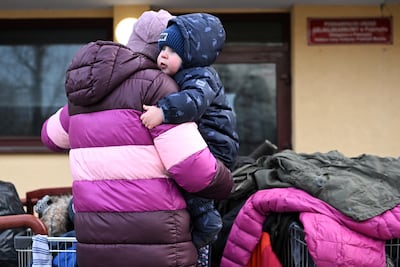
But the widened plan has not calmed criticism of London’s approach to Ukrainian refugees in response to Ms Patel’s refusal to copy the EU by waiving visa rules for those fleeing the conflict.
The bloc estimates that up to four million people may try to leave the country because of the Russian invasion. It has relaxed its rules on refugees and says its member states will welcome the refugees with “open arms” and allow them to settle there for three years.
Ms Patel rejected calls for visa waivers by telling Parliament they presented a risk to national security.
“Russian troops are seeking to infiltrate and merge with Ukrainian forces” and there are “extremists on the ground” in Ukraine, she said.
“Given this and also Putin’s willingness to do violence on British soil, and in keeping with our approach which we have retained consistently throughout all emergency evacuations including in Afghanistan, we cannot suspend any security or biometric checks on people we welcome to our country.
“We have collective duty to keep the British people safe and this approach is based on the strongest security advice.”
MPs and campaigners say UK not doing enough to help
Several UK charities have called on the British government to set up an urgent and properly funded resettlement programme for Ukrainians fleeing the Russian invasion and to offer a wider package of access and support, regardless of existing ties to the country.
Ms Patel told MPs that a humanitarian sponsorship pathway would open up a route to Britain for Ukrainians who do not have family ties in the country but have links with other people, charities, businesses or community groups.
She said there would be no numerical limit and that the programme would be open to “as many Ukrainians that wish to come and have match sponsors”.
The Government had previously said it would work with the UN refugee agency to identify people on the border and also liaise with councils, the devolved administrations and people and organisations wanting to be involved.
The war in Ukraine has given rise to comparisons with other recent wars and their effect on migration through Europe.
With the number of refugees fleeing the country expected to reach the millions, the UN said on Monday that more than half a million Ukrainians had entered neighbouring countries to the west, including Poland, Romania, Slovakia, Hungary and Moldova.
The UK has delivered mixed messages on the sort of safe haven it could offer.
Balkans War between 1991 and 1999
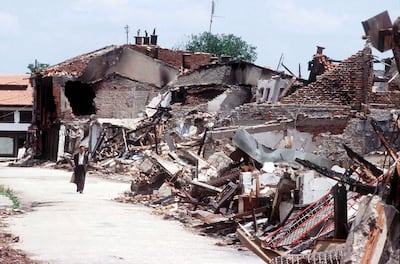
After Yugoslavia’s disintegration in the 1990s, Eastern Europe was affected by a sudden wave of mass displacement and migration. The Bosnian War raged from 1992 to 1995, and conflict erupted in neighbouring Kosovo in 1998. Overall, more than 100,000 people were killed and three million people displaced during the eight years of conflict in the Balkans.
During this period, the UK took in 2,500 Bosnians and later 24,000 Kosovars as refugees after negotiating quotas with other EU members.
Iraq War 2003–2011
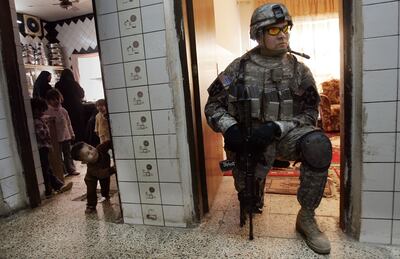
The invasion and eight-year occupation of Iraq led to about 400,000 civilian deaths and made about five million refugees. Civil sectarian conflict erupted after US and British troops withdrew in 2011, causing another wave of violence, death and displacement.
Britain never opened a specific refugee resettlement programme for Iraqi civilians. It did, however, launch the Gateway Protection Programme in March 2004, under which 1,721 Iraqis were settled, among other nationalities.
The UNHCR notably denounced the small number of Iraqi asylum applications accepted by the EU and the UK; in 2005, Britain granted protection to only 8.7 per cent of Iraqi asylum-seekers.
London-based research charity Action on Armed Violence has said that between 2010 and 2020 the UK Home Office refused 77 per cent of the 16,706 asylum claims made by Iraqis.
Syrian War from 2011

The Syrian civil war began as a popular protest movement against the regime of Bashar Al Assad.
In March 2011, it morphed into a multi-sided proxy war fought between various domestic and foreign forces. At least 350,000 Syrians have been killed during the decade of conflict, and about 13.5 million Syrians, more than half the country’s population, have been forcibly displaced.
In 2014, the UK launched the Syrian Vulnerable Persons Resettlement Scheme to provide sanctuary to several hundred people. In 2015, its remit was extended to resettling 20,000 Syrians fleeing the conflict by 2020.
In 2016, the Vulnerable Children’s Resettlement Scheme was launched to resettle up to 3,000 at-risk children and their families from Egypt, Iraq, Jordan, Lebanon and Turkey by 2020.
Hong Kong-China conflict 2020

After China’s imposition of the National Security Law on the people of Hong Kong in July 2020, the UK government introduced a new immigration route for Hong Kong British National (Overseas) status holders, providing the opportunity for them and their family members to live, work and study in the UK and a path to citizenship.
By December 2021, about 90,000 BNO status holders and their family members had applied for visas. Britain previously predicted about 154,000 Hong Kongers would arrive in the first year, and as many as 322,000 over five years, but uptake has been so high that the figure is expected to surpass half a million.
War in Afghanistan 2001-2021
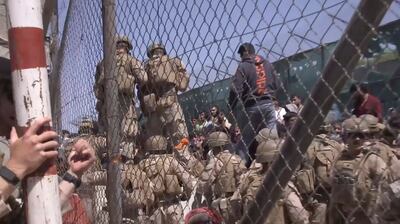
The war in Afghanistan began in October 2001, with American-led coalition air strikes against airports and terrorist training camps in response to the 9/11 terrorist attacks in the US. In August 2021, when British and US forces withdrew, the Taliban swiftly regained control of the country.
At least 200,000 people were killed during the 20-year war. But a further two decades of conflict that preceded the US invasion has led to what the UN calls one of the world’s largest protracted refugee situations, with about six million displaced Afghans.
After the Afghan government collapsed in August, the British government quickly responded with “Operation Warm Welcome”, in which 15,000 people were flown to the UK within two weeks. A further 1,500 Afghans left the country in the months that followed.
Most evacuees in August left under the Afghan Relocations and Assistance Policy, which opened in 2021. It offers relocation in the UK to Afghans who meet the Arap criteria and have worked for or alongside the British government.
Britain’s other refugee programme
In 2021, the UK Resettlement Scheme was launched to replace the VPRS and the Vulnerable Children’s Resettlement Scheme. With an expanded geographical focus beyond the Middle East and North Africa, the UKRS is accessible to the most vulnerable refugees around the world who have been assessed for resettlement by UNHCR. Unlike previous programmes, UKRS has no quota.
Community Sponsorship is similar to that of the UKRS but rather than local authorities taking responsibility for a resettled family or individual, community groups provide housing and support.
Community sponsor groups must demonstrate that they have suitable plans and resources in place to support a refugee or family.
The Mandate Resettlement Scheme is a global initiative. It resettles recognised refugees with a close family member in the UK who is willing to accommodate them.
Family reunification is a limited option available to refugees who have settled in Britain and want to apply to bring their child or partner over to join them. According to the UK Home Office, more than 29,000 Refugee Family Reunion visas were granted between 2016 and 2021.
